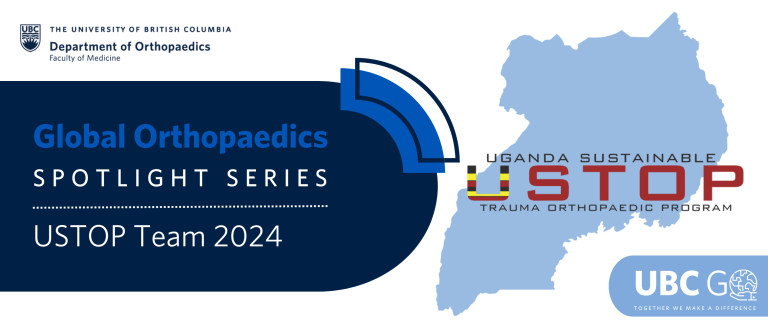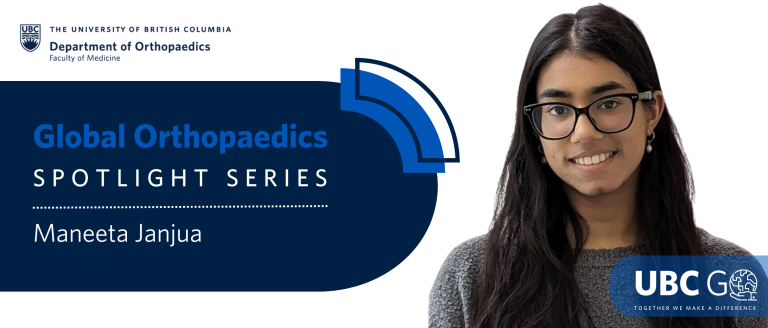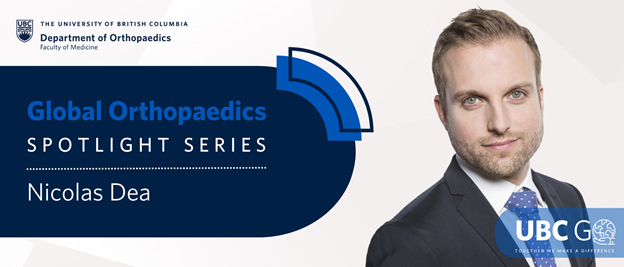Our UBC Global Orthopaedics (UBC GO) Spotlight series features in-depth conversations with a UBC Department of Orthopaedics member about their involvement in global orthopaedic initiatives.
In this next spotlight, we learn about UBC Clinical Professor Emeritus and orthopaedic surgeon, Dr. Piotr Blachut.
Dr. Blachut’s interest in orthopaedics stemmed from his enjoyment of mechanical aspects of medicine. His venture into global health began in 2007 when he first joined the Uganda Sustainable Trauma Orthopaedics Program (USTOP) alongside Dr. Peter O’Brien. Together, the team implemented a two-fold approach at the Mulago hospital. They addressed the high incidence of femur fractures and leveraged their NGO experiences to teach local clinicians efficient patient management. Despite facing challenges such as limited resources and exposure to foreign pathogens, USTOP proved profoundly educational for both Ugandan and Canadian surgical communities. Read more for a deeper understanding of USTOP’s impacts and Dr. Blachut’s contributions in Uganda.

PIOTR BLACHUT
Project/Initiative:
USTOP
What inspired your interest in global health/surgery/orthopaedics?
When I started in medicine, I found that the mechanical aspects of Orthopaedics suited my interests and capabilities. I had always enjoyed using my hands, so surgery was always in the cards.
In 2007, Dr. Shafique Pirani, who was running a clubfoot project in Uganda, approached my partner, Dr. O’Brien, having noted a desperate need for improved orthopaedic trauma care in Uganda. He asked Dr. O’Brien if he’d be interested in going on a fact-finding mission to determine what might be done and in turn I, and others, were invited to join him. That was the start of the Uganda Sustainable Trauma Orthopaedic Program (USTOP).
What did you do?
There being a very heavy burden of fractures, and particularly fractures of the femur, our initial approach was to demonstrate what could be accomplished, within their infrastructure, by a systematic approach to the management of these injuries at the main national hospital, Mulago. With a team of nurses, anesthesiologists, therapists, surgeons, and resident surgeons, each always working with a Ugandan counterpart, we had great success.
Teaching/training
This initiative continued on subsequent missions including other hospitals, but our approach expanded to bring a focus on education with the inception of didactic and practical hands-on courses aimed at the Ugandan trainees. By introducing an interesting program and giving Ugandans the opportunities to interact with international groups, young students were attracted to the orthopaedics field adding much needed new manpower to the speciality.
We always brought some of our orthopaedic residents with us on our USTOP trips, allowing our trainees to interact with local trainees on an equal level. Our residents found it enlightening, and this also ensured the Ugandan trainees didn’t feel intimidated by only interacting with senior surgeons. Bringing our residents also garnered us staff for future missions.
Research
Our work in Uganda provided us with great opportunities to do research alongside our Ugandan colleagues, in the process allowing us to share our expertise in this domain. This collaboration resulted in a number of high quality papers, some highlighting the unique challenges in orthopaedic care in their environment.
Engineering
The Engineering department at UBC approached USTOP, asking if we had any interesting projects that we could give to their biomedical engineering students. This led to a collaboration in the development of cheap, innovative devices to make provision of orthopaedic care in underdeveloped countries more attainable. Arbutus Medical, a successful Vancouver company, is one of the offshoots of this initiative.
Where did you find the funding?
Our USTOP trips were mostly self-funded, all our USTOP members volunteered their own time and transportation costs. We did some fundraising to cover the on-the-ground operational costs in Uganda. We were unsuccessful in our attempts to obtain grant funding.
We were also fortunate to receive great support from our hospitals, our orthopaedic equipment suppliers, and other goods suppliers, in terms of donation of goods, to facilitate our missions.
One thing we’re probing and looking into is sustainability. Do you think your projects were able to achieve sustainability?
Since our program isn’t directed at providing funds or resources, but we instead is focused on education and training in Uganda, the effects are lasting and sustainable.
Looking back, what do you think were the key insights and main barriers that you faced?
Barriers:
- One of the barriers was buy-in from the local orthopaedic community. The Ugandan orthopaedic department had other programs coming in that were bringing money and high-end equipment. We weren’t always accommodated as smoothly as we hoped, especially considering the assets we brought to their trainees.
- Another obstacle was the availability of supplies and orthopaedics instrumentation in Uganda. USTOP would’ve liked to teach the clinicians at Mulago much more, but we were confined to working within their very low resource environment.
Insights:
- We were exposed to lots of pathology that we fortunately aren’t faced with here. Everyone on our teams gained an appreciation of how lucky we are, or perhaps even how too rich our system may be. Here, we get upset if we don’t have the newest, fanciest gadgets, but in Uganda, the surgeons don’t always get those tools. It was highly educational for us to see what can be done with very little.
Are you working on any projects right now? What are your future plans/implications?
I am retired and no longer in the orthopaedic domain, but USTOP continues to function under the leadership of other faculty members, some of whom were resident members of our teams in the early years, such as Dr. Jeff Potter and Dr. Dave Stockton.








